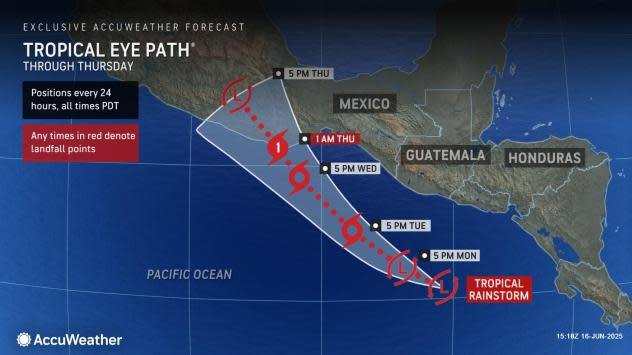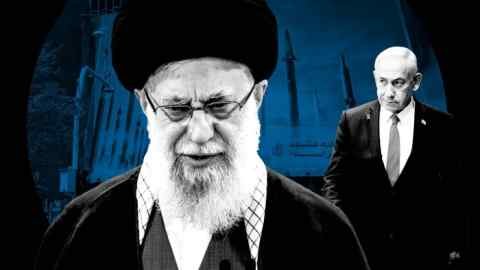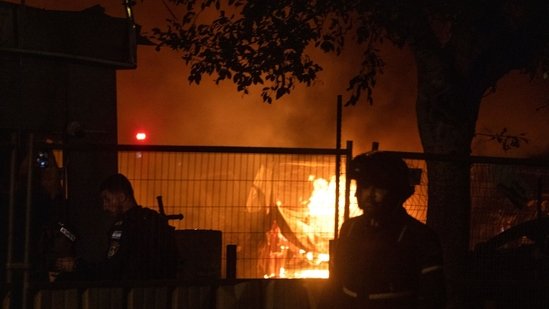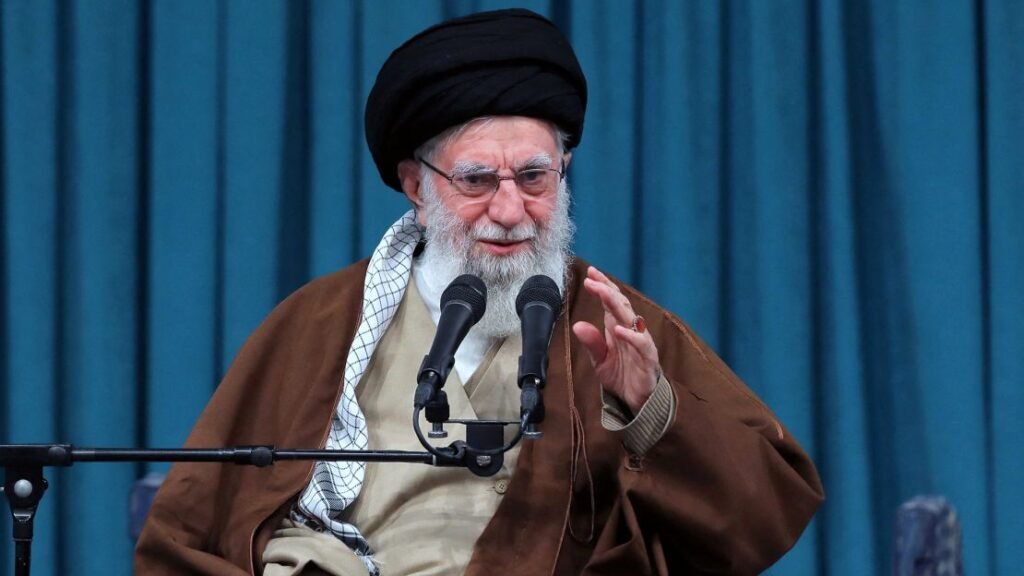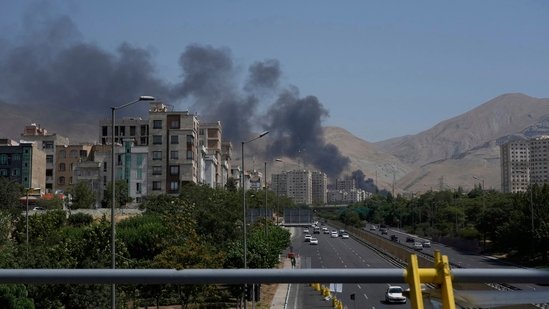The news anchor was in full flow, both hands raised to emphasise her point.
Suddenly, a loud explosion rent the air, audibly shattering glass and plunging the main studio of Iran’s state broadcaster into darkness. As she scurried from her seat, debris fell from the ceiling and smoke wafted across the screen. Off-camera, a male voice cried out “Allahu Akbar” – “God is Great”
Israel’s attack on the headquarters of state television in Tehran marked the dramatic culmination of a day of mayhem that spread panic throughout the Iranian capital.
Credit: IRINN
Having neutralised the city’s air defences with ease, Israeli forces took advantage of their freedom of manoeuvre to strike targets across the city.
From early morning until well into the night, the city echoed to the crump and crunch of explosions, beginning with a strike on the headquarters of the regime’s elite Quds force and ending, as darkness fell, with the attack on its chief mouthpiece.
The Israeli military had issued a warning ahead of the strike, ordering the evacuation not just of the IRIB building housing the broadcaster but of the entire District 3 in northern Tehran – a bustling suburb of 330,000 people housing government buildings, diplomatic missions and UN offices.
The word spread slowly. Internet connectivity in Iran has been severely disrupted in recent days, meaning some missed initially missed the message. But word eventually got out, prompting terrified residents to pour out of apartments blocks and escape the area as best they could.
Amid the panic, the station defiantly stayed on air – and resumed transmission just a few minutes after the blast, with Peyman Jebeli, the head of the station, appearing in front of the cameras, looking visibly shaken and clutching a bloodied piece of paper. Whatever Israel did, he told viewers, he and his colleagues would continue “standing until the end.”
As he spoke, fire raged in parts of the building and emergency workers tended to the wounded. It was unclear how many staff at the station were injured – or if any were killed.
Credit: Anadolu Agency via Reuters; IRINN
Israel justified the attack even before it had taken place, with the country’s defence minister warning: “the Iranian propaganda and incitement megaphone is about to disappear. Evacuation of nearby residents has begun.”
The defiance inside the building stood in stark contrast to the chaos engulfing the rest of Tehran, a city of nearly ten million.
Authorities appealed for calm. What they got was headlong panic. Once again, anxious queues formed outside petrol stations, most of them empty of fuel. Those unable to fill their cars stood on the roadside with their suitcase-clutching families, desperately trying to hail a taxi or thumb a lift out of town.
Even the few who succeeded often got nowhere.
For hours, traffic on motorways leading out of the city was at a standstill.
“It’s like doomsday,” one resident said. “We don’t know what to do. We never thought this would happen. We never thought war would come to Tehran.”

For hours, traffic on motorways leading out of Tehran was at a standstill – Atta Kenare/AFP
As the death toll rose – with Iran’s health ministry reporting at least 224 killed and 1,400 injured since Friday – the forces that once manned Tehran’s air defence systems stood by helplessly as Israel struck the city at will.
Iran’s military has not been fully defanged, however. The regime responded fire with fresh ballistic missile barrages launched at Israel’s cities, killing at least eight people. A total of 24 have died since open hostilities began on Friday.
And there was more to come, vowed Iran’s foreign minister Abbas Araghchi.
“Our powerful armed forces are making clear to the world that the war criminals hiding in shelters in Tel Aviv will not go unpunished for their crimes,” he posted on X. “We will continue to pummel the cowards as long as needed to make sure that they are no longer firing at our people.”
Unlike Iran, Israel’s skies are still protected by one of the world’s most sophisticated anti-missile shields – though its interceptors are only neutralising about 85 percent of Iranian launches, a lower success rate than Israeli commanders had hoped.
The reasons remain unclear. According to Giora Eiland, former head of Israel’s National Security Council, it may be that some missiles use navigation systems that alter their trajectory shortly before impact, making them harder to intercept.
“When you have a navigation system, it means that the Israeli air defences cannot predict exactly what the route of the missile will be,” he said. “That may be why we’ve missed more of them that we really wanted.”
Despite mounting civilian casualties, Israeli military officials say that relief may be on the horizon. Israel has eliminated around 30 per cent of Iran’s ballistic missile stockpile and neutralised about half its firing capacity, according to Capt. Masha Michelson, an IDF spokeswoman.
Airstrikes on Iran’s missile bases account for much of that success. But significant damage was also inflicted by off-the-shelf quadcopter drones assembled and launched by Mossad operatives positioned near the sites.
As Iranian troops attempted to move missiles from storage to the sites, undercover teams deployed the drones to destroy warheads either as they were being transported in military lorries or as they were being fixed into position.
“We strike a terror target ad then we eliminate launchers and trucks carrying ballistic missiles,” Capt Michelson explained. “We have been able to narrow the Iranian regime’s ability to fire ballistic missiles at Israel by 50 per cent.”

The Israeli military had issued a warning ahead of the strike, ordering the evacuation of Tehran’s entire District 3 – Getty Images
The destruction of much of Iran’s air defences and the erosion of its ballistic missile capacity has emboldened Benjamin Netanyahu, Israel’s prime minister.
“We are on the way to declaring victory,” he said as he visited the Tel Nof air base in central Israel. “We are on our way to achieving our two goals: elimination of the nuclear threat and elimination of the missile threat.”
In a sign of Israel’s rising confidence, Mr Netanyahu openly toyed with defying a taboo laid reportedly set by Donald Trump when he declined to rule out targeting Iran’s supreme leader, Ayatollah Ali Khamenei.
Addressing a news conference, the prime minister again did not respond directly to questions about whether he sought regime change in Iran, although he said he believed the leadership could collapse as a result of Israel’s offensive.
‘We are changing the face of the Middle East’
“It’s impossible to predict, but it could be the result of our mighty action,” he said. “We are changing the face of the Middle East, and this could lead to far-ranging changes within itself.”
Gen Eiland, however, insisted that although Iran’s regime could collapse as a result of Israel’s action it was unlikely to happen soon and was not among the chief military objectives of the operation.
“It is important to emphasise regime change is not one of the formal, explicit goals that we are fighting for,” he said. “But there is an implicit hope that it will happen sooner or later.”

